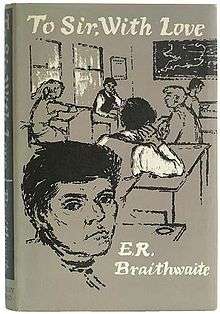To Sir, With Love (novel)
 First edition | |
| Author | E. R. Braithwaite |
|---|---|
| Country | United Kingdom |
| Language | English |
| Genre | Autobiographical novel |
| Publisher | Bodley Head |
Publication date | 1959 |
| Media type | |
| Pages | 200 pp (paperback) |
To Sir, With Love is a 1959 autobiographical novel by E. R. Braithwaite set in the East End of London. The novel is based on true events concerned with Braithwaite taking up a teaching post in a school there.
In 1967, the novel was made into a film, To Sir, with Love, starring Sidney Poitier and Lulu, and the film's title song became a number-1 hit that year. The setting for the film was changed from postwar London to the "swinging sixties", and, notwithstanding its success, Braithwaite had ambivalent feelings towards it, as he admitted in an interview with Burt Caesar conducted for a 2007 BBC Radio 4 programme entitled To Sir, with Love Revisited (produced by Mary Ward Lowery).[1] Also in 2007, the novel was dramatized for Radio 4 by Roy Williams and broadcast in two parts, starring Kwame Kwei-Armah.[2]
Plot
Ricky Braithwaite is an engineer from British Guiana who has worked in an oil refinery in Aruba. Coming to Britain just before the outbreak of World War Two, he joins the RAF and is assigned to an aircrew. Demobbed in 1945, he is unable to find work despite his qualifications and experience due to prevailing anti-black attitudes. After discussing his situation with a stranger, he applies for a teaching position and is assigned to Greenslade School, a secondary school in London's East End.
Most of the pupils in his class are unmotivated to learn, and are only semi-literate and semi-articulate. He persists despite their unresponsiveness to his approach. Students attempt to discourage & demoralize him by disruptive noises,constant use of the adjective bleeding in the classroom and,finally, the burning of an used tampon in the fireplace. This last caused Mr.Braithwaite to lose his temper and reprimand all the girls.
Braithwaite decides to try a new approach, and sets some ground rules. The students will be leaving school soon and will enter adult society, so he will treat them as adults and allow them to decide what topics they wish to study. In return, he demands their respect as their teacher. This novel approach is initially rejected, but within a few weeks the class is largely won over. He suggests out-of-school activities including visits to museums, which the students have never experienced before. A young teacher, Gillian Blanchard, volunteers to assist him on these trips. Some of the girls start to speculate whether a personal relationship is budding between Braithwaite and Gillian. The trip is a success and more are approved by the initially sceptical headmaster.
The teachers and the Student Council openly discuss all matters affecting the school including curricula. The general feeling is that Braithwaite's approach is working, although some teachers advocate a tougher approach.
The mother of one of the girls speaks privately to Braithwaite about the girl's troubling attraction to nightlife, feeling that he has more influence with her impressionable daughter.
Braithwaite and Gillian fall deeply in love and discuss marriage. Her parents are openly disapproving of a mixed-race marriage, but realise that the couple are serious and intelligent and must be trusted to make the right decision.
Criticism
In a review of several of Braithwaite's books, F. M. Birbalsingh wrote:[3]
Unfortunately, the narration of Mr. Braithwaite’s problems in To Sir, With Love is greatly weakened by the rapid and simple solutions that he offers [...] As his frequent acceptance of glowing tribute from admiring colleagues suggests, what chiefly concerns Mr. Braithwaite, regardless of the problems at hand, is the satisfactory projection of his own image as a rather talented and thoroughly civilised black man. [...] All that To Sir, With Love really achieves is a sordid demonstration of the author’s vanity.Nor is his description of specifically racial problems any more discerning. Mr. Braithwaite is shocked when refused social status equal to a Briton with academic qualifications and level of conduct similar to his own; and he constantly stresses the ease with which he could assimilate into British society if only his colour were disregarded [...] Prejudice against him is unfair, he claims, because of his social accomplishment, not because of his humanity; and he implies thereby that prejudice against black people who lack similar cultural habits may be justified.
References
- ↑ Susie Thomas, "E. R. Braithwaite: 'To Sir, with Love' - 1959", London Fictions.
- ↑ Radio Drama reviews Online - To Sir with Love by E. R. Braithwaite, adapted by Roy Williams, BBC Radio 4 Extra, 18-19 May 2011.
- ↑ F. M. Birbalsingh (1968): “To John Bull, With Hate”, Caribbean Quarterly 14: 74–81.